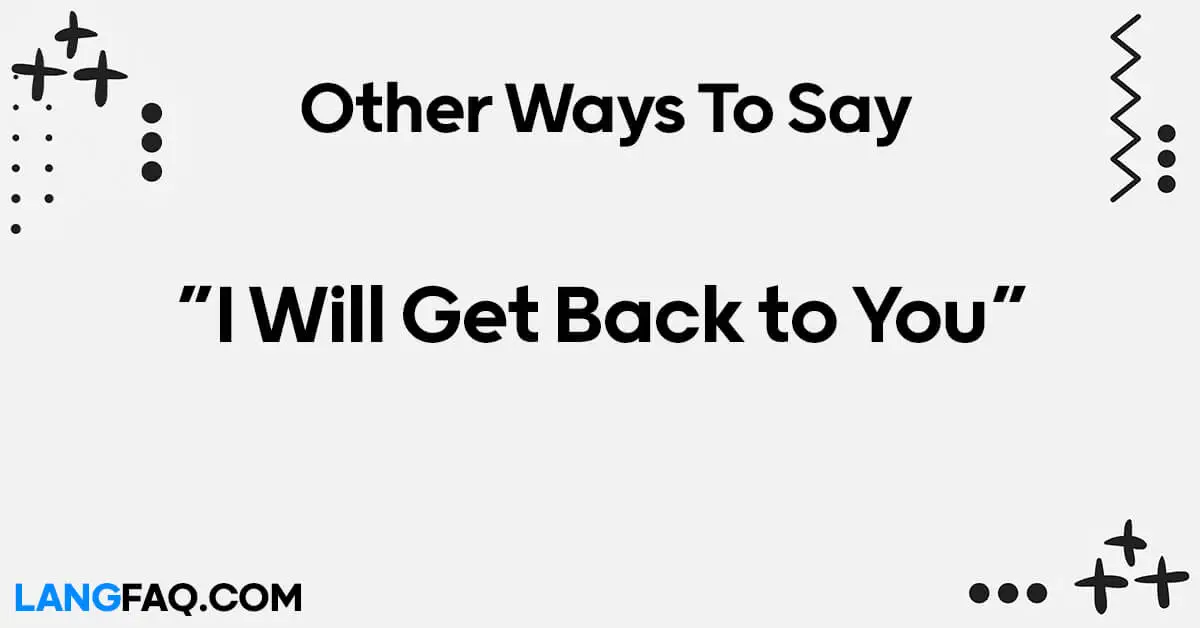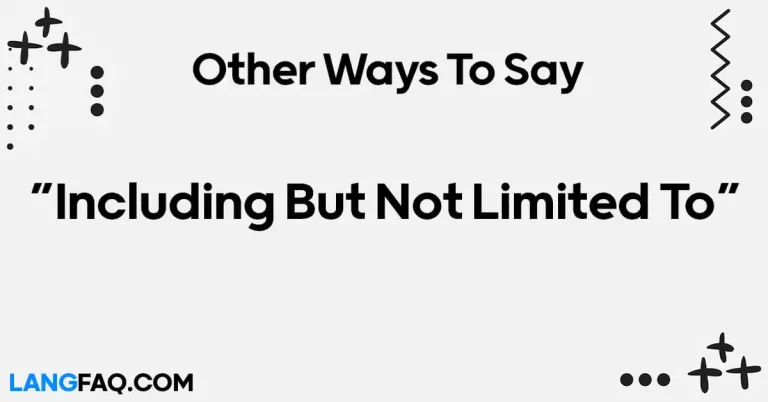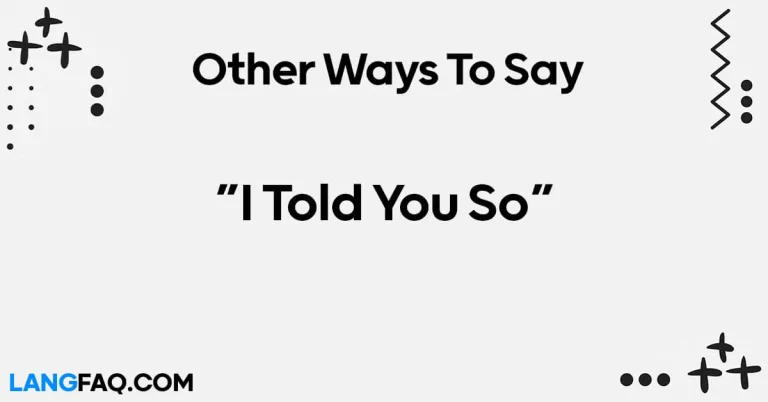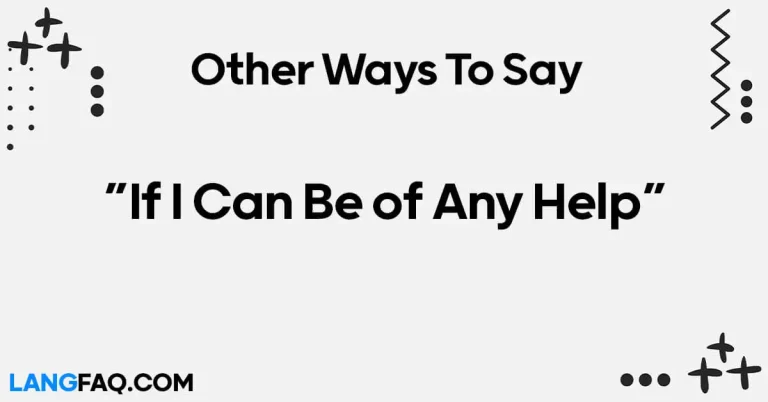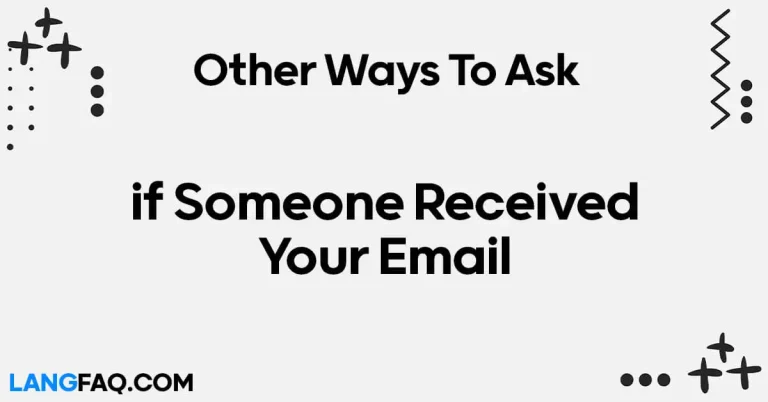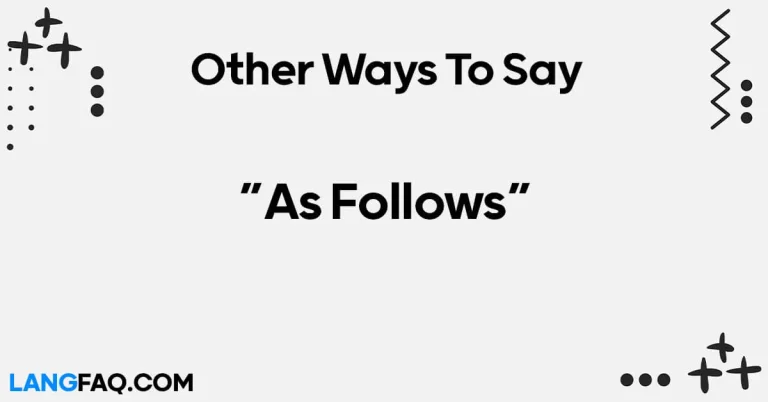Communication is the cornerstone of effective relationships, both personally and professionally. In the realm of responsiveness, saying “I Will Get Back to You” is a common phrase. However, expanding your verbal repertoire can elevate your communication game. In this guide, we delve into 12 alternative ways to express the same sentiment, providing you with nuanced options for various situations.
12 Other Ways to Say “I Will Get Back to You”
Here are 12 alternative ways to say “I will get back to you”:
- I’ll circle back to you shortly.
- Let me check on that and get back to you.
- I’ll touch base with you in a bit.
- Allow me some time to look into this, and I’ll respond.
- I’ll follow up with you at the earliest convenience.
- Give me a moment to gather the information, and I’ll be back in touch.
- I’ll make it a priority to provide you with an update.
- Let me consult with my team, and I’ll reach out to you.
- I’ll review the details and get back to you promptly.
- I’ll ensure you receive a timely response.
- Allow me some time to consider this, and I’ll revert shortly.
- I’ll take a moment to think about it and then get back to you.
Here’s a table with meanings and examples for the 12 alternative ways to say “I will get back to you”:
| Expression | Meaning | Example |
|---|---|---|
| I’ll circle back to you shortly. | I will revisit the topic soon. | “Thanks for the update; I’ll circle back to you shortly.” |
| Let me check on that and get back to you. | I’ll investigate and provide a response. | “I’m not sure about that now, but let me check on that and get back to you.” |
| I’ll touch base with you in a bit. | I’ll connect with you shortly. | “I have a few tasks to complete, but I’ll touch base with you in a bit.” |
| Allow me some time to look into this, and I’ll respond. | I’ll examine the matter and reply. | “Your query is important; allow me some time to look into this, and I’ll respond.” |
| I’ll follow up with you at the earliest convenience. | I’ll reach out to you as soon as possible. | “I appreciate your question; I’ll follow up with you at the earliest convenience.” |
| Give me a moment to gather the information, and I’ll be back in touch. | I need time to collect data and respond. | “Your request requires some research; give me a moment to gather the information, and I’ll be back in touch.” |
| I’ll make it a priority to provide you with an update. | I’ll prioritize giving you information. | “Your request is important; I’ll make it a priority to provide you with an update.” |
| Let me consult with my team, and I’ll reach out to you. | I’ll discuss with colleagues before responding. | “This involves teamwork; let me consult with my team, and I’ll reach out to you.” |
| I’ll review the details and get back to you promptly. | I’ll examine the specifics and reply quickly. | “Your query needs attention; I’ll review the details and get back to you promptly.” |
| I’ll ensure you receive a timely response. | I’ll make sure you get a quick reply. | “Your inquiry is noted; I’ll ensure you receive a timely response.” |
| Allow me some time to consider this, and I’ll revert shortly. | I need time to think, and I’ll respond soon. | “Your suggestion requires thought; allow me some time to consider this, and I’ll revert shortly.” |
| I’ll take a moment to think about it and then get back to you. | I need time for consideration before responding. | “It’s a complex matter; I’ll take a moment to think about it and then get back to you.” |
Effectively communicating the intention to respond later involves a variety of expressions, each tailored to different situations. Whether prioritizing, consulting, or reviewing details, these alternatives provide a nuanced way to convey the same message. Choose the one that best fits the context for clearer and more dynamic communication.
Is It Correct to Say “I Will Get Back to You”?
Yes, “I will get back to you” is a commonly used and correct phrase in English. This expression is a polite and professional way to inform someone that you need time to consider, gather information, or address their inquiry, and you will respond to them at a later time.
When to Use “I Will Get Back to You”:
1. Professional Settings:
- Example: In a business meeting, if a colleague asks a detailed question, you might respond, “I appreciate your question. I will get back to you with a thorough answer after reviewing the necessary information.”
2. Casual Conversations:
- Example: When a friend asks for your opinion on a matter that requires thought, you might say, “Let me think about it. I will get back to you later today with my thoughts.”
3. Email Correspondence:
- Example: In written communication, especially in emails, this phrase is commonly used. For instance, “Thank you for your inquiry. I will get back to you as soon as I have the required details.”
4. Decision-Making Processes:
- Example: If you are involved in a decision-making process and need time to weigh your options, you could say, “I appreciate your patience. I will get back to you once I have carefully considered all the possibilities.”
Related Phrases:
- I’ll circle back to you shortly.
- Let me check on that and get back to you.
- I’ll touch base with you in a bit.
- Allow me some time to look into this, and I’ll respond.
- I’ll follow up with you at the earliest convenience.
- Give me a moment to gather the information, and I’ll be back in touch.
- I’ll make it a priority to provide you with an update.
- Let me consult with my team, and I’ll reach out to you.
- I’ll review the details and get back to you promptly.
- I’m considering your query and will revert shortly.
- I’m weighing my options and will inform you soon.
- I’m gathering more information and will get back to you promptly.
Grammar and Usage Tips:
- Ensure you fulfill the commitment to get back to the person within the agreed timeframe.
- Use this phrase when you genuinely need time to provide accurate and thoughtful responses.
- Adjust the formality of the expression based on the context and relationship with the person.
Professional Mail Example With “I Will Get Back to You”
Subject: Response to Your Inquiry
Dear [Recipient’s Name],
I hope this email finds you well. Thank you for reaching out and bringing your inquiry to my attention. I appreciate your interest and am committed to providing you with the most accurate and thorough response.
Upon reviewing your question, I realize that it requires careful consideration and, in some cases, consultation with the relevant team members. Please allow me some time to gather all the necessary information to address your query adequately.
I understand the importance of your inquiry, and I want to assure you that I will get back to you promptly with a comprehensive response. My goal is to provide you with valuable insights and ensure that your questions are thoroughly addressed.
In the meantime, if you have any additional details or specific points you would like me to consider in my response, please feel free to share them. Your input is highly valued, and I want to ensure that my reply is tailored to meet your expectations.
I appreciate your patience and understanding as I work on this. If there are any urgent matters that require immediate attention, please don’t hesitate to let me know, and I will do my best to prioritize accordingly.
Once again, thank you for choosing [Your Company/Organization]. I look forward to getting back to you with the information you need.
Best regards,
[Your Full Name] [Your Position] [Your Contact Information] [Your Company Name]
1. I’ll Circle Back to You Shortly: Navigating Timely Responses
In the fast-paced world of professional communication, ensuring a swift yet thoughtful response is essential. “I’ll circle back to you shortly” is a versatile phrase suitable for various settings. Use it when promising a timely follow-up, whether in a formal business email or a casual work conversation.
Example Scenario: Imagine you’re in a virtual meeting, and a colleague raises a question that requires further investigation. Your response: “Great question! I’ll circle back to you shortly with the necessary details.”
Variations for Different Contexts:
- Colleagues: “I’ll circle back to you shortly after checking with the team.”
- Friends: “I’ll circle back to you shortly; just need to confirm some plans.”
- Mentor-Mentee: “I’ll circle back to you shortly after reviewing your draft.”
Email Sample:
Subject: Follow-up on Your Inquiry
Hi [Colleague’s Name],
Thank you for bringing up that insightful question in today’s meeting. I wanted to let you know that I’ll circle back to you shortly with the information you requested. I appreciate your patience.
Best regards, [Your Name]
2. Let Me Check on That and Get Back to You: Ensuring Accuracy in Responses
In situations where precision is key, saying “Let me check on that and get back to you” conveys a commitment to providing accurate information. This phrase is especially useful when dealing with queries that demand thorough verification.
Example Scenario: Imagine you receive an email inquiry about specific project details. Your response: “I appreciate your question. Let me check on that and get back to you with the accurate project updates shortly.”
Variations for Different Contexts:
- Colleagues: “Let me check on that and get back to you after consulting the team.”
- Friends: “Let me check on that and get back to you about our weekend plans.”
- Mentor-Mentee: “Let me check on that and get back to you after reviewing your proposal.”
Email Sample:
Subject: Verifying Project Details
Hi [Recipient’s Name],
Thank you for reaching out. I want to ensure I provide you with the most accurate information. Let me check on that specific project detail, and I’ll get back to you shortly.
Best regards, [Your Name]
3. I’ll Touch Base with You in a Bit: Fostering Regular Communication
For ongoing matters or when assuring someone of consistent updates, saying “I’ll touch base with you in a bit” creates an expectation of continuous communication. This phrase is ideal for maintaining an open line of dialogue.
Example Scenario: Picture a project where regular updates are crucial. Your assurance: “I appreciate your input. I’ll touch base with you in a bit to keep you informed about the project’s progress.”
Variations for Different Contexts:
- Colleagues: “I’ll touch base with you in a bit after the team meeting.”
- Friends: “I’ll touch base with you in a bit to discuss our travel plans.”
- Mentor-Mentee: “I’ll touch base with you in a bit to review your progress on the assignment.”
Email Sample:
Subject: Ensuring Regular Updates
Hi [Recipient’s Name],
Your involvement is vital to the project’s success. I wanted to let you know that I’ll touch base with you in a bit to keep you in the loop about any developments. Looking forward to our continued collaboration.
Best, [Your Name]
4. Allow Me Some Time to Look into This, and I’ll Respond: Demonstrating Thoroughness
When faced with inquiries that require in-depth examination, expressing “Allow me some time to look into this, and I’ll respond” emphasizes your dedication to providing a comprehensive and accurate answer.
Example Scenario: Imagine receiving a complex query from a client. Your commitment: “Thank you for bringing this to my attention. Allow me some time to look into this, and I’ll respond with a detailed solution shortly.”
Variations for Different Contexts:
- Colleagues: “Allow me some time to look into this, and I’ll respond after consulting the team.”
- Friends: “Allow me some time to look into this, and I’ll respond about our weekend plans.”
- Mentor-Mentee: “Allow me some time to look into this, and I’ll respond after reviewing your proposal.”
Email Sample:
Subject: Researching Your Inquiry
Hi [Client’s Name],
Thank you for your question. I want to provide you with the best possible answer. Allow me some time to look into this, and I’ll respond with a thorough solution shortly.
Best, [Your Name]
5. I’ll Follow Up with You at the Earliest Convenience: Prioritizing Responsiveness
When emphasizing the priority you place on a response, saying “I’ll follow up with you at the earliest convenience” assures the recipient that their inquiry is important and will be addressed promptly.
Example Scenario: Imagine receiving an urgent message that needs attention. Your assurance: “I understand the urgency. I’ll follow up with you at the earliest convenience to ensure a swift resolution.”
Variations for Different Contexts:
- Colleagues: “I’ll follow up with you at the earliest convenience after discussing with the team.”
- Friends: “I’ll follow up with you at the earliest convenience to finalize our plans.”
- Mentor-Mentee: “I’ll follow up with you at the earliest convenience after reviewing your progress.”
Email Sample:
Subject: Addressing Your Urgent Inquiry
Hi [Recipient’s Name],
I acknowledge the urgency of your inquiry. Rest assured, I’ll follow up with you at the earliest convenience to address this matter promptly.
Best regards, [Your Name]
6. Give Me a Moment to Gather the Information, and I’ll Be Back in Touch: Assuring Accuracy Through Thorough Research
In situations where accurate information is paramount, expressing “Give me a moment to gather the information, and I’ll be back in touch” communicates your commitment to thorough research before responding.
Example Scenario: Imagine being asked for specific data during a meeting. Your commitment: “I appreciate your question. Give me a moment to gather the information, and I’ll be back in touch with the accurate data.”
Variations for Different Contexts:
- Colleagues: “Give me a moment to gather the information, and I’ll be back in touch after consulting the team.”
- Friends: “Give me a moment to gather the information, and I’ll be back in touch about our weekend plans.”
- Mentor-Mentee: “Give me a moment to gather the information, and I’ll be back in touch after reviewing your proposal.”
Email Sample:
Subject: Collecting Data for Your Query
Hi [Recipient’s Name],
Thank you for your question. To ensure accuracy, give me a moment to gather the information, and I’ll be back in touch with the data you requested.
Best, [Your Name]
7. I’ll Make It a Priority to Provide You with an Update: Prioritizing Communication
Expressing “I’ll make it a priority to provide you with an update” conveys your commitment to keeping the other party informed. This phrase is ideal for situations where regular updates are crucial.
Example Scenario: Imagine managing a project where stakeholders expect consistent communication. Your assurance: “I appreciate your involvement. I’ll make it a priority to provide you with an update on the project’s progress.”
Variations for Different Contexts:
- Colleagues: “I’ll make it a priority to provide you with an update after the team meeting.”
- Friends: “I’ll make it a priority to provide you with an update on our plans.”
- Mentor-Mentee: “I’ll make it a priority to provide you with an update after reviewing your progress.”
Email Sample:
Subject: Ensuring Regular Updates
Hi [Recipient’s Name],
Your engagement is vital to the project’s success. I wanted to assure you that I’ll make it a priority to provide you with regular updates. Looking forward to our continued collaboration.
Best, [Your Name]
8. Let Me Consult with My Team, and I’ll Reach Out to You: Emphasizing Team Collaboration
In scenarios involving teamwork, saying “Let me consult with my team, and I’ll reach out to you” communicates a collaborative approach. This phrase is suitable for situations where decisions require input from multiple parties.
Example Scenario: Imagine receiving a proposal that involves team decisions. Your commitment: “Thank you for your proposal. Let me consult with my team, and I’ll reach out to you with our collective feedback shortly.”
Variations for Different Contexts:
- Colleagues: “Let me consult with my team, and I’ll reach out to you after our team meeting.”
- Friends: “Let me consult with my friends, and I’ll reach out to you about our weekend plans.”
- Mentor-Mentee: “Let me consult with my colleagues, and I’ll reach out to you after reviewing your progress.”
Email Sample:
Subject: Discussing Your Proposal with the Team
Hi [Recipient’s Name],
Thank you for your proposal. To ensure a comprehensive response, let me consult with my team, and I’ll reach out to you with our collective feedback shortly.
Best, [Your Name]
9. I’ll Review the Details and Get Back to You Promptly: Ensuring Thorough Consideration
When faced with intricate details that require careful consideration, expressing “I’ll review the details and get back to you promptly” assures the recipient that your response will be both thoughtful and timely.
Example Scenario: Imagine receiving a request for a detailed review. Your commitment: “I appreciate your request. I’ll review the details and get back to you promptly with a comprehensive response.”
Variations for Different Contexts:
- Colleagues: “I’ll review the details and get back to you promptly after discussing with the team.”
- Friends: “I’ll review the details and get back to you promptly about our upcoming plans.”
- Mentor-Mentee: “I’ll review the details and get back to you promptly after evaluating your progress.”
Email Sample:
Subject: Comprehensive Response to Your Request
Hi [Recipient’s Name],
Your request deserves careful consideration. I’ll review the details and get back to you promptly with a comprehensive response. Thank you for your patience.
Best regards, [Your Name]
10. I’m Considering Your Query and Will Revert Shortly: Conveying Deliberation in Decision-Making
For scenarios requiring thoughtful decision-making, expressing “I’m considering your query and will revert shortly” communicates your dedication to making informed choices. This phrase is suitable for both professional and personal contexts.
Example Scenario: Imagine being asked for your input on a critical decision. Your assurance: “Thank you for involving me in the decision-making process. I’m considering your query and will revert shortly with my thoughts.”
Variations for Different Contexts:
- Colleagues: “I’m considering your query and will revert shortly after discussing with the team.”
- Friends: “I’m considering your query and will revert shortly about our plans.”
- Mentor-Mentee: “I’m considering your query and will revert shortly after evaluating your progress.”
Email Sample:
Subject: Deliberating on Your Query
Hi [Recipient’s Name],
I appreciate your inclusion in the decision-making process. I want to assure you that I’m considering your query and will revert shortly with my thoughts. Your insights are valuable.
Best, [Your Name]
11. I’m Weighing My Options and Will Inform You Soon: Embracing Thoughtful Decision-Making
For decisions that involve careful consideration, expressing “I’m weighing my options and will inform you soon” conveys the depth of thought invested. This phrase is ideal for situations where thorough decision-making is essential.
Example Scenario: Imagine being asked for your decision on a project approach. Your commitment: “I appreciate your patience. I’m weighing my options and will inform you soon about our chosen approach.”
Variations for Different Contexts:
- Colleagues: “I’m weighing my options and will inform you soon after consulting with the team.”
- Friends: “I’m weighing my options and will inform you soon about our weekend plans.”
- Mentor-Mentee: “I’m weighing my options and will inform you soon after evaluating your progress.”
Email Sample:
Subject: Decision-Making Process
Hi [Recipient’s Name],
Thank you for your patience as we navigate this decision. I want to assure you that I’m weighing my options and will inform you soon about our chosen approach.
Best regards, [Your Name]
12. I’m Gathering More Information and Will Get Back to You Promptly: Ensuring Informed Responses
When additional information is required, expressing “I’m gathering more information and will get back to you promptly” demonstrates your commitment to providing well-informed and accurate responses.
Example Scenario: Imagine receiving a request for more details on a specific topic. Your commitment: “I appreciate your inquiry. I’m gathering more information and will get back to you promptly with the relevant details.”
Variations for Different Contexts:
- Colleagues: “I’m gathering more information and will get back to you promptly after discussing with the team.”
- Friends: “I’m gathering more information and will get back to you promptly about our plans.”
- Mentor-Mentee: “I’m gathering more information and will get back to you promptly after evaluating your progress.”
Email Sample:
Subject: Additional Information for Your Inquiry
Hi [Recipient’s Name],
Your inquiry is important. I’m currently gathering more information and will get back to you promptly with the relevant details. Thank you for your understanding.
Best regards, [Your Name]
FAQs
How do I ensure prompt responses in professional communication? In professional communication, ensure promptness by using phrases like “I’ll respond shortly” or “I’ll address your inquiry shortly,” reflecting your commitment to timely interactions.
When should I use phrases like “I’ll consult my team” or “I’m gathering more information”? Use these phrases when collaboration or additional information is required. They convey transparency and dedication to thorough decision-making.
Is it appropriate to say, “I’ll take a moment to deliberate” in business communication? Absolutely. This phrase reflects thoughtfulness in decision-making, assuring stakeholders that you prioritize careful consideration.
How can I convey ongoing updates in a project? Express your commitment to continuous communication by saying, “I’ll keep you posted” or “I’ll ensure timely feedback,” fostering transparency and trust.
What’s the significance of saying, “I’m awaiting further instructions”? This phrase indicates your readiness for guidance, ensuring you align your actions with given instructions for a seamless process.
How can I balance promptness and accuracy in responses? Strike a balance by using phrases like “I’ll respond shortly” for promptness and “I’ll review the details and respond accordingly” for accuracy, showcasing your commitment to both.
Conclusion
Mastering the art of communication involves more than just words; it’s about conveying intentions effectively. With these 12 alternative ways to say “I Will Get Back to You,” you can navigate diverse scenarios with confidence and professionalism.

